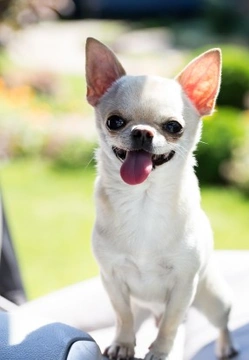
Help! My Chihuahua is a tiny terror!
While the Chihuahua is the smallest dog breed in the world, nobody told the dogs themselves this, and the diminutive little Chihuahua has a huge personality! It often comes as a surprise to dog owners to learn that the Chihuahua can in some cases be one of the most challenging dogs to train, but this is more due to the fact that they often get treated like babies and not dogs rather than any issue with the dog itself!
Chihuahuas are popular as pets among people who love small dogs, and they fit well into small homes and apartments that otherwise might not be able to accommodate a larger dog. They are also popular with celebrities as “handbag dogs,” which has led to a prevalence of people following this trend, and buying a little dog such as the Chihuahua to port around with them everywhere, sometimes neglecting the canine needs of this smallest of dogs.
Chihuahuas are also one of the pedigree dog breeds most likely to be surrendered to rehoming shelters, as left untrained or improperly managed, they can become unruly, snappy, bad tempered and out of control.
It is of course important to start as you mean to go on with a Chihuahua as with any other dog, training them from the get-go and not allowing them to get into bad habits. The Chihuahua properly trained from a young age should behave like any other dog; obedient, good-natured, not prone to snapping, and responsive to commands.
However, if you find that things are not what they should be with your Chihuahua or that you have adopted an older dog that is already set in their ways, it can be hard to know how to correct the assorted issues that this presents.
It’s time to go back to basics, put your dog into your own form of canine boot camp, and get your Chihuahua’s attention back on their correct place in your pack.
Read on to learn more.
Make sure you view your Chihuahua as a dog
The main issue that leads to bad behaviour in the Chihuahua comes from a failure at some stage with their ownership to see the dog as a dog, and treat them accordingly. It is perfectly fine to love your dog like a child, as long as you treat it like a dog! The other issue is that because the Chihuahua is small and delicate, it can be hard to know how to discipline them; however, no dog benefits from physical chastisement or negative reinforcement training, so this should really not be an issue.
Firm and unambiguous commands, clear guidelines, and positive reinforcement training is the way forwards.
Dealing with a snappy Chihuahua
If your Chihuahua is snappy and nips or bites you, you will be only too well aware of how sharp those little teeth can be, and that they can cause some serious damage! The most common pinch points and reasons for snapping come from the Chihuahua seeing themselves as the alpha of your pack, and ergo, when you do something that they do not like or try to assert yourself, they will snap to put you in your place.
If you Chihuahua expects to be fed treats, sleep in your bed or get the best spot on the sofa and gets growly or snappy when you change things, you have an alpha dog on your hands. You now need to re-assert yourself and put yourself back into the position of the alpha within the home, and teach your little dog that they are not the boss of you!
Go back to basics, and do not feed your dog scraps, snacks or your own food. Do not let them sit in your lap at mealtimes, and remove them from the sofa if they will not give up their seat when told. Sleeping in your bed with you can also blur boundaries when you are trying to establish a training regime, so close your dog out of the bedroom at night, and ensure that they have their own warm basket to sleep in.
Do not fall for puppy dog eyes, crying and begging! You will be doing your little dog a disservice in the end.
Teaching your dog boundaries
Your little dog must learn that benefits such as having treats and sitting on the sofa are privileges and not rights. If your Chihuahua snaps or protests, they lose their privileges, and need to be put on a time-out until they are ready to go at things again. Reserve treats for training only, and make sure that you keep your responses to your dog consistent in all circumstances.
Training basics
Every dog, including the Chihuahua, should know and respond to the basic training commands at a very minimum. If your dog will not sit, stay, come when called, stop what they are doing when you tell them to and go to their bed or crate when commanded to, teaching them these commands should be your priority. It is also important that your Chihuahua will walk on the lead happily, and is not carried everywhere.
Start from the very basics with positive reinforcement training, using treats to reward compliance and withholding them for bad manners or bad behaviour. Don’t expect and adult Chihuahua who is set in their ways to change overnight, but accept that you have to be in it for the long haul, and that it will take time, patience and consistency to get your dog back under control.



